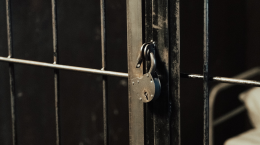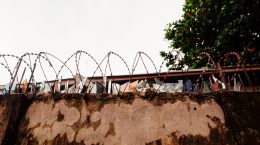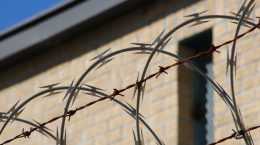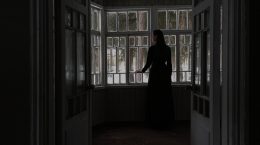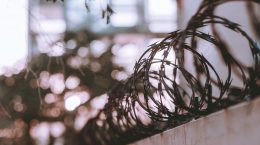The state press writes that it is a paradise here: walks, a library, a video library with modern movies, and twice a year family visits are allowed. However, in early August, a terrible letter from political prisoner Sergei Vereshchagin appeared on the Internet. In it, a 31-year-old convict tells the chilling details of life in penal colony 13 in Glubokoye. Sergey was able to transfer this letter to freedom through the released comrade and asked to publish it, considering that as many people as possible should know about it.
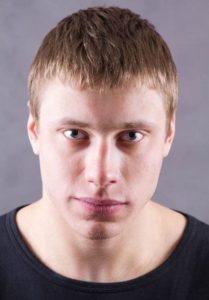 Sergei Vereshchagin was arrested on August 12, 2020. On that day, he saw from the window how the police beat people in the street. He started shouting at the security forces from the window and threw a plastic bottle at them. The police broke into his apartment, severely beat, and detained him. They beat the man in the police station too: they hit him on the head with truncheons, jumped on it. He received a severe craniocerebral injury, a contusion of the brain, hematomas, and contusions of the chest, three parts of the spine, and temporal regions. They were in no hurry to provide medical assistance to Sergei, only on August 14, 2020, the lawyer came to him and demanded to show the prisoner to doctors.
Sergei Vereshchagin was arrested on August 12, 2020. On that day, he saw from the window how the police beat people in the street. He started shouting at the security forces from the window and threw a plastic bottle at them. The police broke into his apartment, severely beat, and detained him. They beat the man in the police station too: they hit him on the head with truncheons, jumped on it. He received a severe craniocerebral injury, a contusion of the brain, hematomas, and contusions of the chest, three parts of the spine, and temporal regions. They were in no hurry to provide medical assistance to Sergei, only on August 14, 2020, the lawyer came to him and demanded to show the prisoner to doctors.
Sergei Vereshchagin’s trial began in November. The injured policemen said: Sergei shouted obscene words at them from the window, threatened to shoot them, threw not only a plastic bottle, but also a glass vodka bottle, and kicked one of them in the eye. At the same time, the accused was drunk, behaved aggressively, tried to hit the security officials, and resisted the arrest.
Elena, Sergei’s mother, told a completely different version of what happened: according to her, her son was shouting from the room for the security forces to move away from the girls. The woman reprimanded him, asked him to be prudent, and he promised that he would no longer be. And then the police came. As soon as Sergei stepped forward, they twisted his arms, threw him to the floor and handcuffed him. He began to shout and ask for help. In the morning, at the entrance, Elena saw drops of blood and concluded that it was the blood of her son.
Those present in the court did not escape the fact that Sergei’s speech was impaired, he constantly leaned against the wall of the cage and closed his eyes. In the last word, the man said: “Let me go home, I do not understand what is happening.” But Sergei was not released, he was sentenced to five years in prison and sent to penal colony 13, one of the most severe colonies in Belarus.
“When I arrived at the colony, I was in quarantine for two weeks. During this time, I became a vicious violator of the regime, although I did not violate anything. The first two violations were written to me for lying down on the bunk bed when I felt dizzy and passed out, even though my card was marked “bed rest”. The third punishment was fictitious: that I allegedly smoked. I tried to prove that I did not commit this violation, but I was simply presented with a fact: you are deprived of visits and parcels for this,” Sergei Vereshchagin writes .
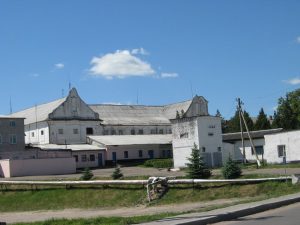 During the quarantine, all possible “preventive records” were hung on the political prisoner: that he was prone to extremism, suicide, might organize an attack on the administration, take hostages. Sergei did not receive timely medical assistance: “I am constantly dizzy, I began to see poorly, I have numbness on the left side of my whole body, constant severe headaches, I am losing consciousness. All joints in my arms and legs are broken, from which I constantly feel severe pain. I tried to get to the medical unit, the head and other doctors. They wouldn’t let me in. On my way to the medical unit, I was always stopped by prison staff and sent back for various reasons or no reason.”
During the quarantine, all possible “preventive records” were hung on the political prisoner: that he was prone to extremism, suicide, might organize an attack on the administration, take hostages. Sergei did not receive timely medical assistance: “I am constantly dizzy, I began to see poorly, I have numbness on the left side of my whole body, constant severe headaches, I am losing consciousness. All joints in my arms and legs are broken, from which I constantly feel severe pain. I tried to get to the medical unit, the head and other doctors. They wouldn’t let me in. On my way to the medical unit, I was always stopped by prison staff and sent back for various reasons or no reason.”
The head of the medical unit, Igor Stozhik, was particularly unhappy about his visits to the infirmary. When Sergei was given a referral to a neurologist, Stozhik stopped him and flew into a rage: he ran into the medical unit and scolded all the doctors. The colony’s physician Oleg Dubas directly told the prisoner that he was tired of his illnesses. The head of the medical unit Nadezhda Patkevich simply measured his blood pressure, and Sergei realized that she did not know what to do with him and ordered him to go to work. “I left, slightly moving my legs, in a state close to fainting. After that, dozens of my attempts to get to her were unsuccessful. When I went to the medical unit again, she, seeing me and seeing what I saw of her, told the dispatcher: “Tell him I’m not seeing today,” Sergei Vereshchagin recalls in a letter.
The political prisoner was placed in a punishment cell, where he did not sleep because of the cold for 11 days. There he had a heart attack and was admitted to the hospital with a serious heart rhythm disorder – 37 beats per minute. But even there he received no treatment, only a dropper with atropine, which raises the pulse. However, this only made things worse for Sergei. At the hospital he got a heartache, and now it continues to hurt all the time. After his return to the colony, the administration’s hostility towards him increased.
“The head of the first detachment, Nikolai Rachila, wrote another violation against me, which I did not commit. He wrote that I was talking to a person with whom I did not speak at the time. For this violation I was put in a pre-trial detention centre. I sat alone for nine days. Then they “added” me another 7 days. Because of the cold and dampness there, I did not sleep all this time since it is impossible to fall asleep in such cold weather. Lying on the cold floor, I dreamed of a blanket or a sweater,” said Sergei. As a political prisoner, unlike others, he was forced to work on Saturdays.
Sergei is deprived not only of the opportunity to sleep in a bed, receive medical care and eat normal food, but also to communicate with his family: “They restrict phone calls, and if I am allowed to make them, they are very rare and only in the presence of two policemen, who stand over me and listen so that I can’t say anything to my mother. Recently I learned from my mother that not all my letters reach her. The operative spoke to me, telling me not to write anything more in my letters about my health, which is getting worse every day, I can’t call and talk to my mother about my health either, as I am under complete control.”
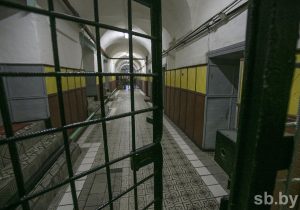
Sergei is not the first to experience torture and torture in the colony in Glubokoye. In 2006, political prisoner Ivan Kruk, convicted under Article 364 of the Criminal Code (violence or threat of violence against a police officer), shared information about what was happening behind the doors of PC-13: “The regime in the cell is strict, it is forbidden to sleep during the day. Therefore, I mainly read legal literature. There is no information from the outside world, the good thing is that his wife constantly passes on the “Narodnaya Volya”, which is read with great attention by everyone in the cell. This is briefly about the conditions in which I find myself.”
In 2016, it became known that within the walls of penal colony 13 no assistance was provided to prisoner Sergei Ischuk, who was sentenced to 12 years in prison under Article 328 of the Criminal Code. For more than six months he lived with a fever of up to 40 degrees, which was brought down with analgen and sent to work. Because of this, the man started having heart problems. His haemoglobin dropped dramatically, and he lost 18 kilograms due to illness. Medical parcels from the family were not accepted. “His health is in a terrible state. After the meeting, I talked with the head of the medical unit, who practically stated in plain text that my husband was dying. I asked to urgently send him to the republican hospital in Minsk to undergo a course of treatment there, because according to the doctor, they can do nothing but fight the symptoms,” said the wife of Sergei Ischuk.
However, the woman’s request to transfer her husband to Minsk for treatment was refused, saying that being in the medical unit for a month was not an indicator. The colony noted: if the man spent more than six months on treatment, then he would be sent to the hospital. On June 6, 2016, it became known that Sergei Ischuk died from the failure to provide medical care. The wife was not even allowed to say goodbye to him.
In 2017, another prisoner, Valentin Pischalov, died in the colony. He fell ill in late November-early December 2016. The temperature rose to 39 degrees, but not only was he not provided with medical assistance, but he was also sent to work at the sawmill. In the last letter, he wrote that he had been ill for a month and a half, had lost a lot of weight, began to wake up at night from suffocation, became weak, did not eat anything, and in the medical unit he was told that everything was fine. Doctors diagnosed him with acute respiratory viral infections, and only on January 3, 2017, a paramedic discovered in a man extrapolatory pneumonia of the upper lobe on the left. On January 4, 2017, the administration of the colony decided to send Valentin Pischalov to the pulmonary department of the Republican Hospital “Prison No. 8”, but he died in an ambulance. Valentin’s relatives asked to initiate a criminal case on the death of a prisoner from the failure to provide medical assistance but were refused.
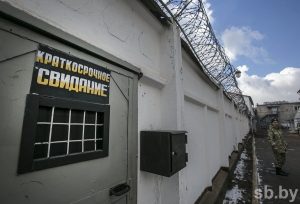 On January 21, 2017, the sister of prisoner Aleksey Ageichik received a letter from his brother. He wrote that the administration of the colony beat him with truncheons, after which he lost consciousness. However, he was not given medical treatment and was sent to an isolation cell for 50 days to heal from his bruises. The prisoner said that this is not the first case of beating of convicts. According to him, torture is a common thing for the administration of the colony. Prisoners are driven to suicide, they are threatened with “driving them into concrete,” and it is easier to kill and write off a person than a dog. The administration is not responsible for this.
On January 21, 2017, the sister of prisoner Aleksey Ageichik received a letter from his brother. He wrote that the administration of the colony beat him with truncheons, after which he lost consciousness. However, he was not given medical treatment and was sent to an isolation cell for 50 days to heal from his bruises. The prisoner said that this is not the first case of beating of convicts. According to him, torture is a common thing for the administration of the colony. Prisoners are driven to suicide, they are threatened with “driving them into concrete,” and it is easier to kill and write off a person than a dog. The administration is not responsible for this.
Yuri Lingo spent nine years within the walls of penal colony 13 and was released in October 2020. Over the years he has accumulated 136 regime offences – and after each of them he has been placed in a punishment cell. Even though Yuri has a disability, he had to sleep on bare boards and shake from the cold at night, because it is very cold in the punishment cell. To this was added the hard work – chopping off 100-kilogram waste cables, motors from tractors, gearboxes in a dirty workshop and in bad light. For this, Yuri received no more than 0,78 euro.
He recalls several horror stories with prisoners: one of them got a drop of metal in his eye and his eye leaked out – he had to have it removed; another, who had cancer, was forced out to work. For such work, prisoners were almost never awarded a pension record, because they did not receive the minimum wage. No one cared about the safety of workers (although, rather, slaves): they were not offered any protective glasses, or gloves and masks. And if an incident happened, they were forced to sign a paper stating that the convicted person was to blame.
PC-13 is the toughest colony in Belarus. Prisoners sentenced to more than 10 years and those sentenced to life imprisonment sit here. Along with rapists, murderers, paedophiles, political prisoners (and there are at least two of them, apart from Sergei Vereshchagin, after the 2020 elections) are serving their sentences. And one of them, who has cancer, is due to stay in prison until December 2021. Sergei Vereshchagin was much less fortunate – most of his term is still ahead. But there are fears that he may not be able to live up to the end of his imprisonment.


